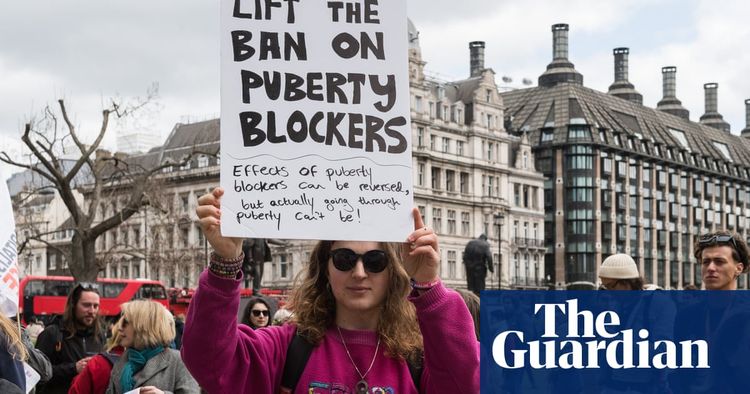Puberty blockers ban motivated by ex-minister’s personal view, UK court told

The high court heard that the ban on prescribing puberty blockers to children was based on the personal opinion of the former UK health secretary and not supported by evidence.
The organization TransActual and a young individual, whose identity is undisclosed, are questioning the urgent decree implemented on 29 May, which prohibited the medications for minors with gender dysphoria in England, Scotland, and Wales. They argue that this decision has had a detrimental impact on over 1,000 individuals under the age of 18.
Speaking on behalf of the claimants in the high court on Friday, Jason Coppel KC stated that there is proof of both self-inflicted harm and suicide attempts caused directly by the legislation.
Victoria Atkins, who was in charge of health at that time, made changes to the rules after the examination by Dr. Hilary Cass regarding gender medicine. The review pointed out the insufficient evidence on the advantages and drawbacks of puberty blockers, but did not suggest banning them.
Coppel stated that Atkins did not pinpoint the "significant health risk" necessary to warrant emergency laws, which skips the normal process of consulting with a specialized group of medical professionals before implementing a ban.
In his written statements, he stated: "The proof indicates that the main reason for issuing the order was solely based on Atkins' personal belief that the Cass report necessitated urgent action."
"Authorities were then given the job of creating reasons to support a ban that aligned with their own opinions. No medical or scientific guidance was considered to determine if the legal requirements were met. This was not enough justification to justify using emergency procedures."
The prohibition makes it so that private doctors cannot prescribe puberty blockers anymore. Only doctors from the NHS can do so, and only within the context of a research study. However, despite Cass's endorsement, there is still no official research study in place according to Coppel.
He informed the court that it was very unusual for an emergency order to be given to stop new patients from being given a supposedly harmful drug while current patients still received it, to stop non-NHS use of a drug for specific patient groups but still allow the drug to be used by the NHS, and to prohibit a drug even though its use followed international guidelines.
He stated that there needs to be solid evidence showing that a medicine poses a significant threat to health, rather than just having possible but unconfirmed risks.
Julian Milford KC, representing the Department of Health and Social Care, stated in written documents that the emergency order was put in place because even though NHSE policy on puberty blockers changed after the Cass review, it did not have a direct impact on private prescriptions in the UK or by prescribers in the European Economic Area. These prescriptions were being issued in ways that did not meet UK standards and were considered unsafe.
He stated: "The health secretary believed it was necessary to quickly pass a law to stop this type of prescription and limit other incorrect prescriptions to prevent serious health risks."
It was important to take precautions to protect vulnerable children's safety. The review, the NHSE, medical regulators, and the Royal College of GPs all recommended and supported legislative action.
He stated that Atkins's determination of the need for an emergency order was a "complicated evaluation, requiring the use of clinical expertise, and the court should be hesitant to interfere."
Milford informed the court that the potential future impacts of drugs on children, such as their mental well-being and understanding of sexuality and gender, were considered to be a significant threat to their overall health.
He stated that TransActual was not left out of the discussion as previously alleged because there was no real discussion, only a "restricted stakeholder activity". Even if they had been consulted, he mentioned, it would not have changed the outcome much.
A decision will be made later. The Labour government plans to keep the ban in place permanently depending on the result of the case.











































